In Spite of Gods
Edward Luce
http://www.amazon.com/Spite-Gods-Strange-Modern-India/dp/0385514743
 It’s been an expanding force since at least 1991, explains journalist Luce, when India let go of much of the protectionist apparatus devised under Nehru after independence in 1947 from Britain, as part of a philosophy of swadeshi (or self-reliance) that’s still relevant in India’s multiparty democracy. From his vantage as the (now former) Financial Times’s South Asia bureau chief, Luce illuminates the drastically lopsided features of a nuclear power still burdened by mass poverty and illiteracy, which he links in part to government control of the economy, an overwhelmingly rural landscape, and deep-seated institutional corruption. While describing religion’s complex role in Indian society, Luce emphasizes an extremely heterogeneous country with a growing consumerist culture, a geographically uneven labor force and an enduring caste system. This lively account includes a sharp assessment of U.S. promotion of India as a countervailing force to China in a three-power “triangular dance,” and generally sets a high standard for breadth, clarity and discernment in wrestling with the global implications of New India. (Jan.)
It’s been an expanding force since at least 1991, explains journalist Luce, when India let go of much of the protectionist apparatus devised under Nehru after independence in 1947 from Britain, as part of a philosophy of swadeshi (or self-reliance) that’s still relevant in India’s multiparty democracy. From his vantage as the (now former) Financial Times’s South Asia bureau chief, Luce illuminates the drastically lopsided features of a nuclear power still burdened by mass poverty and illiteracy, which he links in part to government control of the economy, an overwhelmingly rural landscape, and deep-seated institutional corruption. While describing religion’s complex role in Indian society, Luce emphasizes an extremely heterogeneous country with a growing consumerist culture, a geographically uneven labor force and an enduring caste system. This lively account includes a sharp assessment of U.S. promotion of India as a countervailing force to China in a three-power “triangular dance,” and generally sets a high standard for breadth, clarity and discernment in wrestling with the global implications of New India. (Jan.)
Governance
Arun Shourie
A thoughtful analysis of the Indian bureaucracy, and a call for a need to reform law and procedures. Based on extensive first-hand experience. Many anecdotes, case studies. Administration degenerates into notings on files/regulations, entangle regulations/ institutions, set up to solve problems, become problems/ even matters that endanger national security lose their way in courts, get buried in files/ enterprises become havens of patronage, slovenliness/ a public sector, least accountable to the public, becomes the truly private sector of ministers, officials/the contrast with China/ the way out: an enabling state/ the first requisite for that: exhume, document, expose the true state of affairs/ a unique, insider’s account of what has become of governance/ the unanswerable case for turning the system inside-out/now/.
Falling Over Backwards
Arun Shourie
http://www.indiaclub.com/Shop/SearchResults.asp?ProdStock=18908
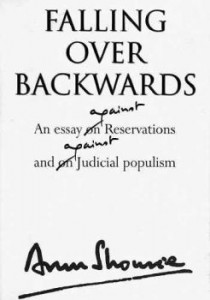 Arun Shourie presents an insightful view into the reservation debate from the most important point: Lawmaking and Judiciary. Today the reservation debate has informed common people on the positive and negative aspects of reservation. However, the major decision making does not involve common people and rests with the Legislatures and the Judiciary. Because of this distribution of power, knowing about how legislature and judiciary have answered the reservation debate in last 60 years of our independence is increasingly important.
Arun Shourie presents an insightful view into the reservation debate from the most important point: Lawmaking and Judiciary. Today the reservation debate has informed common people on the positive and negative aspects of reservation. However, the major decision making does not involve common people and rests with the Legislatures and the Judiciary. Because of this distribution of power, knowing about how legislature and judiciary have answered the reservation debate in last 60 years of our independence is increasingly important.
Guns, Germs and Steel
Jared M. Diamond
http://www.amazon.com/Guns-Germs-Steel-Fates-Societies/dp/0393317552
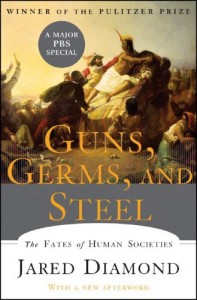 In Guns, Germs, and Steel Jared Diamond presents the biologist’s answer: geography, demography, and ecological happenstance. Diamond evenhandedly reviews human history on every continent since the Ice Age at a rate that emphasizes only the broadest movements of peoples and ideas. Yet his survey is binocular: one eye has the rather distant vision of the evolutionary biologist, while the other eye–and his heart–belongs to the people of New Guinea, where he has done field work for more than 30 years
In Guns, Germs, and Steel Jared Diamond presents the biologist’s answer: geography, demography, and ecological happenstance. Diamond evenhandedly reviews human history on every continent since the Ice Age at a rate that emphasizes only the broadest movements of peoples and ideas. Yet his survey is binocular: one eye has the rather distant vision of the evolutionary biologist, while the other eye–and his heart–belongs to the people of New Guinea, where he has done field work for more than 30 years
India Unbound
Gurcharan Das
http://www.amazon.com/India-Unbound-Revolution-Independence-Information/dp/0385720742
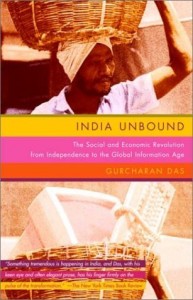 The Book is mainly about the transformation of India from Birth of the writer (1942) – (1991). The author majorly speaks about the Indian Politics, the economy of India. He categorizes the Indian Population in three major groups Spring of Hope (1942-65), the lost Generation (1966-91) & Rebirth of Dream (1991-99). It is a Part memoir, part journalism, part history and part management bible, the book begins shortly before independence and continues until the new millennium. As other Authors cherish the revolution that began with independence in 1947, Gurcharan Das does not find full cause for jubilation until 1991, when India unleashed a series of economic reforms, the start of an ”economic revolution” that he believes ”may well be more important than the political revolution.”
The Book is mainly about the transformation of India from Birth of the writer (1942) – (1991). The author majorly speaks about the Indian Politics, the economy of India. He categorizes the Indian Population in three major groups Spring of Hope (1942-65), the lost Generation (1966-91) & Rebirth of Dream (1991-99). It is a Part memoir, part journalism, part history and part management bible, the book begins shortly before independence and continues until the new millennium. As other Authors cherish the revolution that began with independence in 1947, Gurcharan Das does not find full cause for jubilation until 1991, when India unleashed a series of economic reforms, the start of an ”economic revolution” that he believes ”may well be more important than the political revolution.”
Hot Property
Pat Choate
http://www.amazon.com/Hot-Property-Stealing-Ideas-Globalization/dp/0375402128
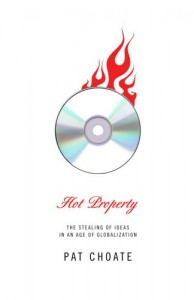 Very well written book providing a history of inventions and how they changed the lives.
Very well written book providing a history of inventions and how they changed the lives.
Choate surveys the history of intellectual property laws in the U.S. as rooted in our Constitution, reflecting the original commitment to protect inventors for the good of our nation’s growth. From this early insight, the U.S. reaped benefits as the nation grew from an agricultural economy to the world’s largest industrial and technological economy. But the U.S., along with other nations, has undercut protection of intellectual property rights with lax enforcement. Choate points to the growth of the U.S. textile industry, aided by industrial espionage and theft, and the fact that today Japan, Germany, and China are using similar tactics to compete against the U.S. The U.S. is suffering huge economic losses as a result of illegal copying of everything from American films to music to books. Choate argues that while our nation’s disinterest in enforcing our intellectual protective laws are often rooted in geopolitical considerations, we pay a hefty price in our economy and job security
The Tao Of Physics
Fritjof Capra
http://www.amazon.com/Tao-Physics-3rd-Updated/dp/0877735948
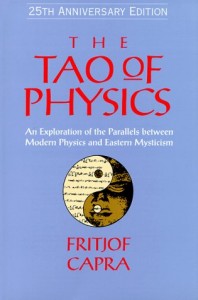 First published in 1975, The Tao of Physics rode the wave of fascination in exotic East Asian philosophies. Decades later, it still stands up to scrutiny, explicating not only Eastern philosophies but also how modern physics forces us into conceptions that have remarkable parallels. Covering over 3,000 years of widely divergent traditions across Asia, Capra can’t help but blur lines in his generalizations. But the big picture is enough to see the value in them of experiential knowledge, the limits of objectivity, the absence of foundational matter, the interrelation of all things and events, and the fact that process is primary, not things. Capra finds the same notions in modern physics. Those approaching Eastern thought from a background of Western science will find reliable introductions here to Hinduism, Buddhism, and Taoism and learn how commonalities among these systems of thought can offer a sort of philosophical underpinning for modern science. And those approaching modern physics from a background in Eastern mysticism will find precise yet comprehensible descriptions of a Western science that may reinvigorate a hope in the positive potential of scientific knowledge. Whatever your background, The Tao of Physics is a brilliant essay on the meeting of East and West, and on the invaluable possibilities that such a union promises.
First published in 1975, The Tao of Physics rode the wave of fascination in exotic East Asian philosophies. Decades later, it still stands up to scrutiny, explicating not only Eastern philosophies but also how modern physics forces us into conceptions that have remarkable parallels. Covering over 3,000 years of widely divergent traditions across Asia, Capra can’t help but blur lines in his generalizations. But the big picture is enough to see the value in them of experiential knowledge, the limits of objectivity, the absence of foundational matter, the interrelation of all things and events, and the fact that process is primary, not things. Capra finds the same notions in modern physics. Those approaching Eastern thought from a background of Western science will find reliable introductions here to Hinduism, Buddhism, and Taoism and learn how commonalities among these systems of thought can offer a sort of philosophical underpinning for modern science. And those approaching modern physics from a background in Eastern mysticism will find precise yet comprehensible descriptions of a Western science that may reinvigorate a hope in the positive potential of scientific knowledge. Whatever your background, The Tao of Physics is a brilliant essay on the meeting of East and West, and on the invaluable possibilities that such a union promises.
Positioning
Al Ries and Jack Trout
http://www.amazon.com/Positioning-Battle-Your-Al-Ries/dp/0071373586
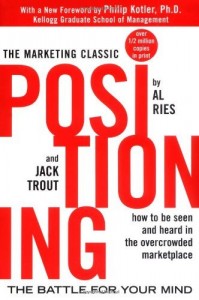 Positioning, a concept developed by the authors, has changed the way people advertise. The reason? It’s the first concept to deal with the problems of communicating in an overcommunicated society. With this approach, a company creates a ‘position’ in the prospect’s mind, one that reflects the company’s own strengths and weaknesses as well as those of its competitors. Witty and fast-paced, this book spells out how to position a leader so that it gets into the mind and stays there, position a follower in a way that finds a ‘hole’ not occupied by the leader, and avoid the pitfalls of letting a second product ride on the coattails of an established one. Revised to reflect significant developments in the five years since its original publication, Positioning reveals the fascinating case histories and anecdotes behind the campaigns of many stunning successes and failures in the world of advertising.
Positioning, a concept developed by the authors, has changed the way people advertise. The reason? It’s the first concept to deal with the problems of communicating in an overcommunicated society. With this approach, a company creates a ‘position’ in the prospect’s mind, one that reflects the company’s own strengths and weaknesses as well as those of its competitors. Witty and fast-paced, this book spells out how to position a leader so that it gets into the mind and stays there, position a follower in a way that finds a ‘hole’ not occupied by the leader, and avoid the pitfalls of letting a second product ride on the coattails of an established one. Revised to reflect significant developments in the five years since its original publication, Positioning reveals the fascinating case histories and anecdotes behind the campaigns of many stunning successes and failures in the world of advertising.




